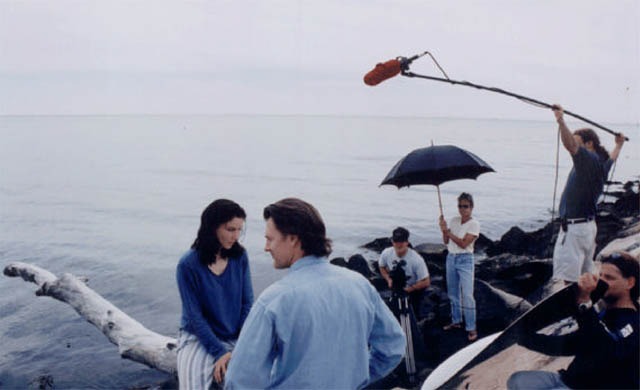
Crossing the Line
Written by Jim Mentink | Posted by: Anonymous
Connecticut native Tom Deedy has a mission — to make us think. Not satisfied with a career in construction and telecommunications, and always having an interest in acting, Deedy began a film career not too long ago. He says there are strong parallels between construction and filmmaking, comparing blueprints to screenplays and explaining that both require the ability to think on one’s feet.
Deedy didn’t choose the traditional route to filmmaking, however. Though he spent four years with the Trinity Repertory ("Incredible," he says) and directed over 100 plays in the course of his 15 years with the Tavern Players, he says that theatre, to him, has run its course. With only his wits and ‘some classes’ he took at a film school in Connecticut, Deedy launched into filmmaking and encourages others with that interest to do the same. In fact, one of the goals of the non-profit side of his company, Tom Deedy Productions, LLC, is to put digital video cameras in the hands of urban youth so they can experience filmmaking and ‘just get out there and do it’. "They need to express their creativity in a positive manner," Deedy says.
When Deedy’s short film "Water Rope" earned a special screening in Los Angeles, and received three stars at an independent film website — that was all the encouragement Deedy needed to continue in his craft. In his TV series "River Street," Deedy explores the contrasts between values and commerce. In it, he describes a double yellow line: On one side it is black asphalt, the other is covered in thin black ice. The question every character in the surreal series — which he compares to "The Twilight Zone" — asks themselves is whether they will cross that line, where the able become disabled and where they must function in reality while dealing with the inner emotions they’re experiencing in the particular episode.
In the pilot as well as the series, an unruly cast of recurring characters jockey for power when Oceanside Institute is put up for sale by the State. Characters include a den of smugglers, severely disabled mental health clients, shady real estate developers, a brother and sister team of psychiatric doctors, and some corrupt and some benevolent state officials. The pilot was shot using all digital equipment including the Panasonic DVX 100 and the Sony DSR300. Even though he believes the resolution of film is better than digital video, he says that DV is getting better and enjoys the convenience of editing work on a home PC.
One of Deedy’s goals in all this is to make the viewer think, specifically about our values. He believes in visual media that asks questions like: Did it make you think? Did it make you feel? What is the cost of freedom? He states that the series will examine how we treat people and how we do business in America.
"How we do business is insight to our values. Our values give us insight to how we live," says Deedy. Asking questions and challenging the materialism or lack of proper values in America is not always popular, but Deedy believes there needs to be producers with the moral courage to raise these questions. He says that every town has a ‘River Street,’ a dilemma of commerce versus values, and believes that it’s something we can all relate to, something that unifies us rather than tears us apart. He believes that we can choose values over commerce, stating, "It can’t be about money, we’re better than that."
Though the series is being pitched by Scott Ferguson of White Tiger in the L.A area, Deedy would like to see the series filmed in New England, as the pilot was shot in and around New London, CT. He says the architecture, intellect and people are attractive features and loves New London for filming because it brings both industry and a level of seediness to the screen.
"Film can bring emotion," Deedy says. "It can remove you from yourself, yet bring emotion and be meaningful." That, along with the ability to do a take 20 or more times, is the reason he prefers film over doing stage plays, with its ‘what you see is what you get’ approach.
In addition to his current endeavor, he is also the writer of several screenplays, including "Battle Axe" which is being filmed in Spain.
Tom Deedy is proud of the work he’s done on the "River Street" series so far, but he says he couldn’t do it alone. The vice president of his company, Charlie Cissel is an integral part of the project, as are Andrew Bell (director of photography, www.pixelshift.net), Bill Hurshman (Art Director) and Jimmy Driscoll, who assisted in locations and plays the part of Jack Malvasi, the real estate developer in "River Street" who wants to turn the hospital for the mentally ill into a housing project. Deedy thanks them along with the great actors and actresses who made the pilot, called "Sweet Little Scam," happen. That pilot, which Deedy describes as "Girl, Interrupted" meets "Miller’s Crossing," though fictional, is based on a real Oceanside Institute inpatient who was referred to as The Monkey Girl.
"What are our values? Where are we on River Street? Do we dare to cross the yellow line ourselves?" Deedy asks. These are questions he believes we need to ask, and answer, ourselves. Do we dare to flip on the light and look into the shadows and discover our values and priorities, making film (and all art) more than entertainment? Or do we take the easier route, the "mind candy,’ and refuse to let a "motion" picture move us? It’s something Deedy believes is worth thinking about.








